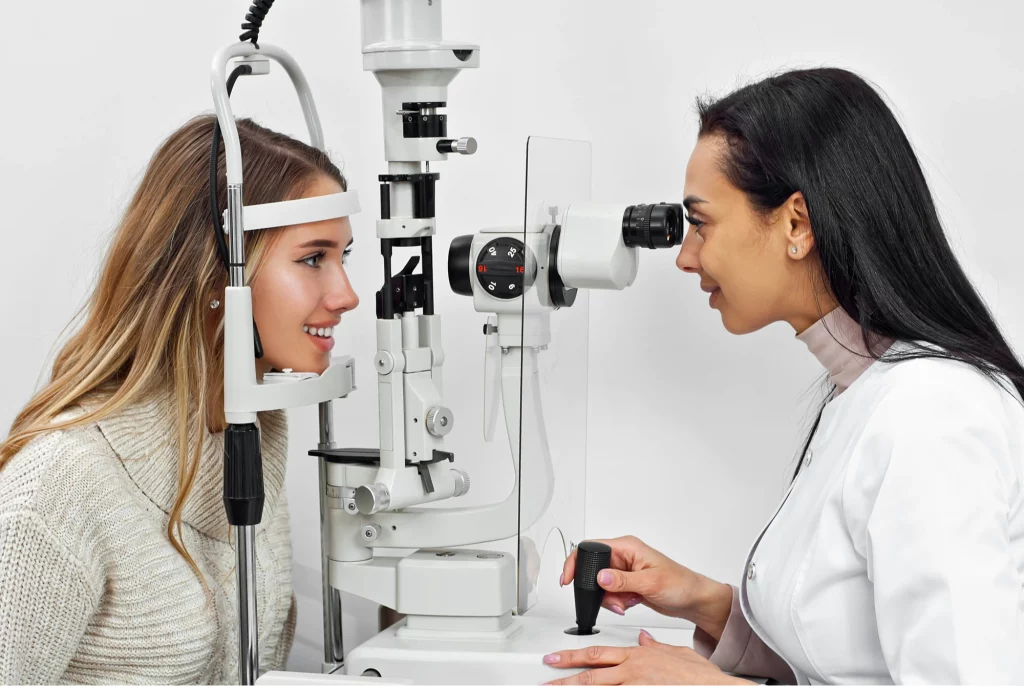Medically Reviewed by: Nicholas P. Bell, M.D.
What to Expect After Glaucoma Surgery
Knowing what to expect after glaucoma surgery can be just as important than knowing what happens during the surgery itself. After all, you won’t be spending your recovery time in a hospital.
As with all eye surgeries, it’s crucial that patients take good care of their eyes post-op in order to protect their eye health and vision. Learn what to expect after glaucoma surgery, the precautions you should take, and the tools that you’ll need for a successful recovery.
What are the different types of glaucoma surgery?
Glaucoma treatment focuses on lowering the intraocular pressure of the eyes caused by fluid buildup. There are glaucoma medications that can help lower intraocular pressure. But what if the body either stops responding to these medications or the patient has reached the maximum dosage? In these cases, glaucoma surgery is typically the next step patients take.
There are many types of glaucoma surgery, and knowing what to expect after glaucoma surgery will depend on which surgery is performed. The three glaucoma surgeries outlined here —selective laser trabeculoplasty (SLT), Trabeculectomy, and shunts/implants — are some of the most common. Note that many patients with glaucoma and cataracts opt to have both surgeries at the same time.
- Selective laser trabeculoplasty (SLT) is, as its name suggests, laser treatment for glaucoma, during which an ophthalmologist creates very small holes to relieve pressure with a laser aimed where the cornea and iris come together. Some patients worry: “Is the SLT surgery painful?” While having a laser pointed at your eye might sound scary, most SLT recipients report little to no discomfort during or after the surgery.
- During a trabeculectomy, an ophthalmologist creates a very small surgical incision to help drain the fluid and decrease the intraocular pressure. The results of this procedure tend to be more permanent than SLT, and typically has a high success rate, according to patients living with a trabeculectomy.
- In this option, shunts or implants are surgically inserted into the eye. You may also hear of these as eye stents for glaucoma. Once completed, these surgeries — including the iStent glaucoma and cataract surgery — allow for the shunt or implant to replace the eye’s damaged draining system, reducing intraocular pressure.
How long does it take to recover from glaucoma surgery?
Recovery time after glaucoma surgery varies per patient and per surgery, but most patients heal within 3 to 6 weeks. Reserve the day after the surgery for recovery time. During the rest of the recovery time, it’s generally recommended that postoperative glaucoma patients avoid strenuous activity. This type of activity includes heavy lifting, exercise, stressful work, etc.
Driving after glaucoma surgery
The day of and the day after surgery, it’s best to coordinate and pre-plan any rides and transportation that you will need. Beyond that, like recovery time, when you can begin driving after glaucoma surgery will depend on the patient or the surgery, with some patients reporting that they feel comfortable driving within a week, and others prefer to wait for up to two months.
Other necessary precautions after glaucoma surgery
When asked about glaucoma surgery, we often receive questions such as, “Is glaucoma surgery dangerous?” and “Is there pain after glaucoma surgery?” Glaucoma surgery is a common procedure and regarded as safe with minimal pain during recovery. We also receive many questions about proper precautions after glaucoma surgery.
With any procedure there is some small risk of infection after surgery. Some common precautions that most doctors recommend their patients take to avoid infection and other issues after glaucoma surgery include:
- Don’t rub or scratch your eyes. It’s common for vision to be blurry for a few days after glaucoma surgery, as well as for your eyes to sometimes feel itchy. Whatever you do, resist the temptation to rub or scratch your eyes.
- Take all prescribed eye drops. These eye drops can help soothe the aforementioned itchiness and stave off infections.
- Avoid heavy lifting and strenuous activity. While no one is asking you to spend the next few weeks on the couch, it’s wise to avoid the gym during recovery time. If your job requires heavy lifting, you may need to request additional time off of work or request other assignments while you recover.
- Avoid swimming pools. No matter how refreshing a dip in the water might sound, swimming pools, hot tubs, and saunas are breeding ground for infection-causing bacteria, and it’s best to avoid them during recovery.
What is the success rate of glaucoma surgery?
Glaucoma surgery has a high success rate. The vast majority of patients report that their eye pressure has gone down after glaucoma surgery, improving their eye health overall.
Thanks to Eye Center of Texas, thousands of Houstonians have received successful glaucoma surgery from our glaucoma specialists in Houston. In fact, over 275 Houston-area eye doctors refer their patients to Eye Center of Texas exclusively. To find out if cataract surgery is right for you, schedule an appointment today.
Related Resources
- 8 Reasons to Consider Multifocal IOLs for Cataracts
- Fuchs Dystrophy and Cataracts: Your Surgery Options
- PRK after LASIK: What you need to know
- Fast-growing Cataracts
- Sun Damage to Eyes: UV and You
Related Articles
Financing Options Available
Apply today to find a financing option that meets your needs.
Our Locations
Houston/Bellaire
6565 W. Loop S., Suite 650Bellaire, TX 77401
Medical Office:
713-797-1010
Medical Fax:
713-357-7276
LASIK/Near Vision:
Office: 713-395-1515
Fax: 713-357-7278
Pasadena
4415 Crenshaw RoadPasadena, TX 77504
Medical Office:
281-977-8800
Medical Fax:
281-977-8877
Sugar Land
15200 S.W. Freeway, Suite 130Sugar Land, TX 77478
Medical Office:
281-277-1010
Medical Fax:
281-277-4504
Clear Lake
455 E. Medical Center Blvd., Suite 110Webster, TX 77598
Medical Office:
281-332-1397
Medical Fax:
281-282-9152
Katy
Greenhouse Medical Plaza2051 Greenhouse Road, Suite 110
Houston, TX 77084
Medical Office:
346-547-7070
Medical Fax:
281-214-2971
The Woodlands/Conroe
100 Medical Center Blvd., Suite 118Conroe, TX 77304
Medical Office:
936-647-1610
Medical Fax:
936-647-1620


